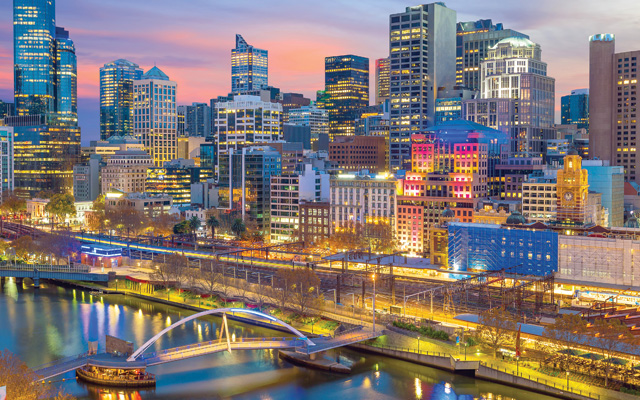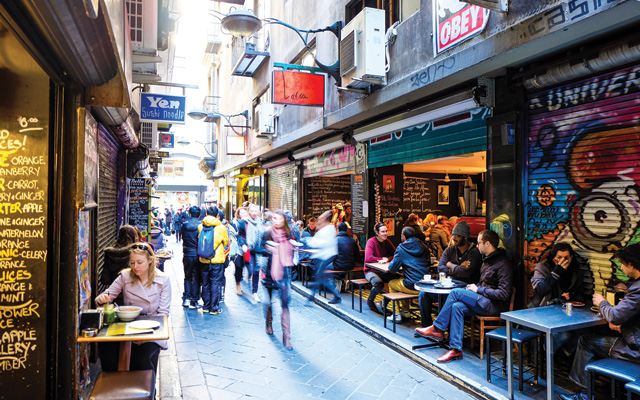Melbourne’s business events strategy is attracting major global events and paving the way for sustained growth in high-yield tourism from key international markets
Melbourne is cementing its place as a sustainability trailblazer in business events, with a deliberate focus on environmental and social leadership shaping its forward-looking strategy.
That focus is translating into results. The city’s calendar is filled with high-profile events that prioritise sustainability and align with the United Nations Sustainable Development Goals.

Among them are the Wind Energy Summit in July, the World Sustainable Built Environment Conference, and the Women Deliver Conference, both scheduled for 2026.
“Our mission extends beyond economic impacts. We are keen to relay the profound social and community benefits that accompany these events,” said Julia Swanson, CEO of the Melbourne Convention Bureau (MCB).
At Melbourne Airport, sustainability is being integrated into core operations, despite the complexity of balancing ambitious targets with daily operations.
“We are the first capital city airport in Australia to commit to net zero for Scope 1 and 2 emissions by 2025. And I’m proud to say we are on track,” said Gigi Yuen, the airport’s head of sustainability and environment.
The airport’s on-site solar farm – already producing 40 megawatts with an additional seven megawatts due this year –is complemented by wind energy to support its embedded renewable network. Other initiatives include investments in electric vehicles and charging infrastructure, ban on single-use plastics introduced ahead of state mandates, and an organic processing unit that converts food waste into fertiliser.
Meanwhile, the Melbourne Convention and Exhibition Centre (MCEC) recently released its net zero roadmap, with plans to achieve net zero by 2050. The venue has embraced a triple bottom line approach – balancing social, environmental, and economic outcomes in a way that supports client goals, according to chief strategy and governance officer Rohan Astley.
Across the city, a growing list of pioneering suppliers and partners have made sustainability a core operational tenet. MCB partner Dann Event Hire, for example, offers products designed to be reused, repurposed or donated to minimise waste.
Business events with the Royal Botanic Gardens Victoria help preserve natural and cultural legacies, while event management companies like NatureBoss promote a direct relationship between business and the natural environment.
“We know from internal research with our clients that sustainability is a must-have, not a nice-to-have. So we really need to over-index,” Swanson told TTGmice.
Melbourne’s pedestrian-friendly city centre infrastructure and efficient public transport also help reduce event-related carbon emissions. Importantly, sustainability does not necessarily come at a premium. As Swanson noted, many venues already incorporate food recycling and waste minimisation as part of their standard offerings.
“Events in Melbourne are not just about large groups visiting and leaving; they are about creating a powerful force for meaningful impact,” she said.
These values are resonating across the Asia-Pacific market. Melbourne is seeing a “leaps and bounds” resurgence in interest from China, signalling a return of large incentive groups. In April, the city welcomed 16,000 delegates for the Amway China Leadership Seminar – the largest incentive group ever hosted in Australia, surpassing Melbourne’s previous record of 12,000. That single event is expected to generate A$100 million (US$64.2 million) in economic impact.
Interestingly, while total visitation numbers from China were down 23 per cent on pre-pandemic levels, expenditure rose by 65 per cent last year, indicating the return of high-yield leisure travellers and corporate incentive groups.

Improved connectivity is also fuelling growth. With new direct routes from Hangzhou and Seoul, and a 300 per cent increase in aviation services from India compared to pre-pandemic levels, Melbourne is strengthening its ties with key Asian markets.
“We’re really seeing growth across all of Asia,” said Swanson. “South-east Asia remains a core market with Malaysia, Indonesia, and Singapore always strong performers for us. Some markets, like Vietnam, are also starting to grow. There’s now a new trade investment office in Vietnam and increased flight connections between us, so that is certainly one market to watch.”
Last year was also a significant year for new hotel openings, pushing the number of total rooms to over 26,000 rooms in the city centre, more than any other Australian city.
MCB’s latest update in February 2025 had 114 confirmed events through to 2028, representing A$613 million in projected economic impact and nearly 108,000 delegates.





















